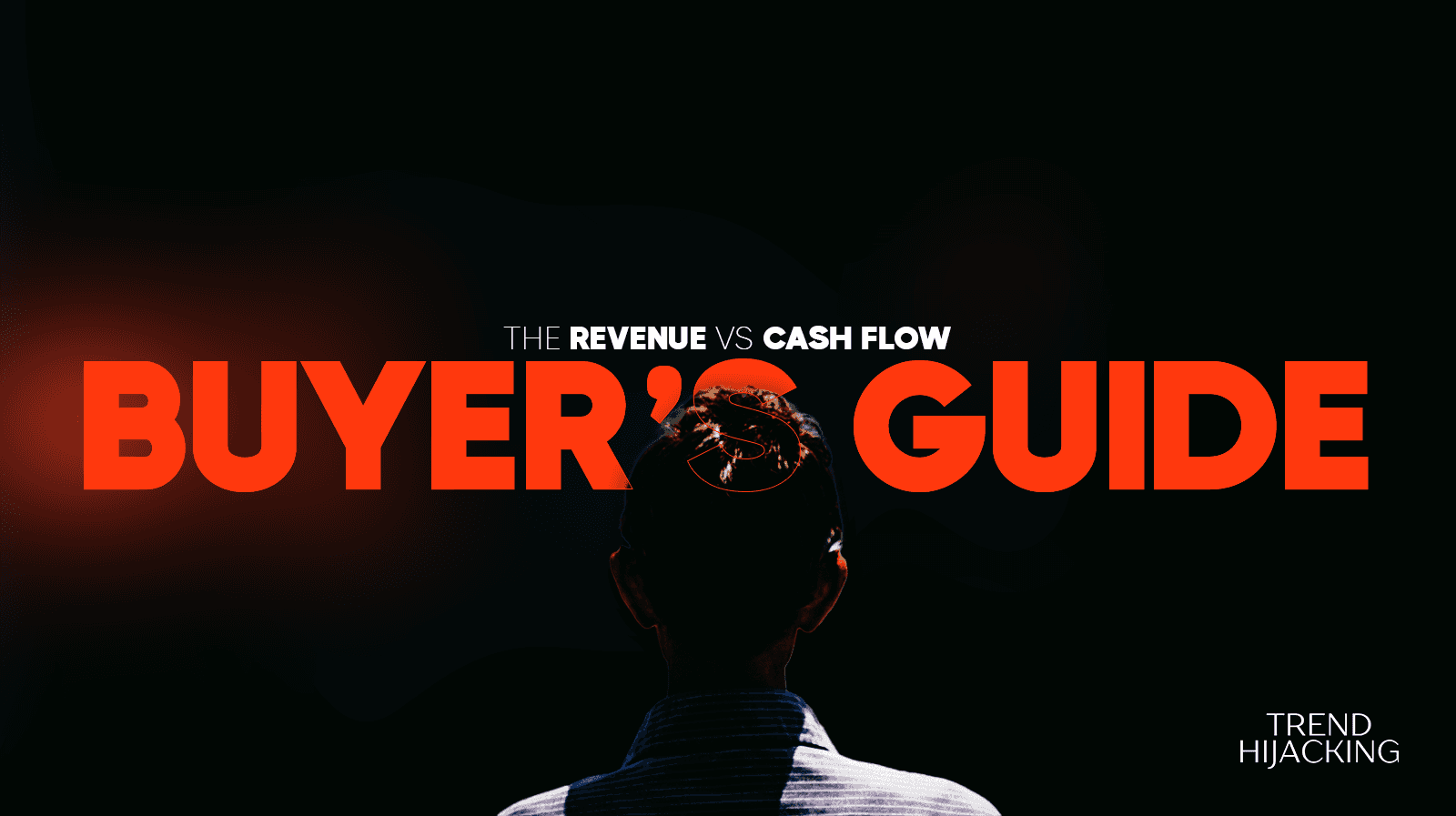
When Is the Right Time To Sell Your E-commerce Business?
Unfortunately, knowing the perfect time to sell can be a hard decision, especially if you’re new to this field.
Your store may be making steady profits, but timing the sale wrong can mean losing hundreds of thousands in value.
So, when is the right time to sell?
Well, the right time to sell your e-commerce business is NOT just when you feel tired or ready for something new; it’s when your store is financially strong, the market conditions are favorable, and the buyer demand is high.
In this guide, we’ll break down the KEY signs, numbers, and strategies that help you decide when it’s time to sell your online business.
Why Timing Matters When Selling Your E-commerce Brand

Not every time is a good time to sell your online business (this is a little-known secret by many business owners).
The price you get depends heavily on the time you choose to exit.
The buyers you’ll be selling to usually pay more for growth, stability, low risk, and smooth operations.
If your business shows rising profits and consistent systems, you’re highly likely to command a higher valuation.
But if it’s lagging or the market is changing, don’t be surprised if it fetches a weaker price.
Still at it, the process of selling an e-commerce store takes time. As business brokers such as Quiet Light agree, selling an e-commerce business often takes several months to over a year.
As such, you must plan ahead.
The “right time” is not the moment you list—it’s when your business is in its strongest possible state.
Sell Your E-Commerce Business Fast
At TrendHijacking, we help you connect with serious investors who are ready to buy e-commerce businesses like yours.
We check all the numbers and present your business in the best light. Our pre-vetted buyers skip the “is this real?” stage, so you can get a better price and close faster.
Submit your business details today and make selling simpler, faster, and more profitable.
Top Signals That Suggest It’s Time to Sell

You’re probably asking yourself if there’s a way to know when it’s time to sell.
Luckily, there are some concrete signs that your business is ready for a sale as outlined below:
1. Profit and Growth Are Strong and Stable
If your business revenue and net profit have grown steadily over the last 2 to 3 years, that’s a strong exit signal.
Remember that buyers want trends, not one lucky month. However, if your earnings are plateauing or dropping, you may get a lower multiple.
2. You Can Step Away (Low Owner Involvement)
If your business runs well without your daily input—say, you only need to spend a few hours per week—that makes it even more appealing to the buyers.
By acquiring your business, buyers aren’t buying your job but an income-generating asset.
If your business comes with documented systems, automation, and delegated tasks, it sells even better.
3. Your Financials Are Clean and Transparent
Clean books, clear tax returns, and consistent accounting build trust.
If your expenses are tangled, or many things are on cash or off the books, buyers will discount.
Good financials streamline the due diligence phase.
4. Your Market Looks Favorable
If your niche is growing, your competition is steady, and there is long-term demand, it’s a good window.
If you see signs of erosion, such as new rivals, shrinking margins, regulatory threats, etc., it may be time to exit before value falls.
5. You Have A Reason Outside the Business
Maybe you want capital for a new venture, or you want more free time. If your motivation is clear and urgent, it helps you avoid hesitation.
But make sure your business is strong when that moment arrives.
Recommended: Where To Sell Your E-commerce Business (5 Top Options)
Metrics and Valuation Benchmarks To Keep In Mind

When planning the right time to sell your e-commerce business, it’s also important to consider how buyers will value your business.
Here are the key metrics buyers will use:
Profit multiple (SDE/EBITDA): Many e-commerce businesses sell around 2–4× seller’s discretionary earnings (SDE) or 3–6× EBITDA, depending on size and structure.
Revenue multiple: Some firms use 0.3–0.5× revenue as a rough measure.
Days on Market: Websites and e-commerce businesses often sell faster than brick-and-mortar ones. According to BizBuySell, the median days on market is about 60 days for online businesses.
These multiples usually depend a lot on risk, growth, operations, traffic sources, and owner dependency.
So the “right time” is when your metrics hit or exceed benchmarks in your niche.
If your profit multiple is well justified, demand is high, and the business is well-documented, that is a strong moment to sell.
How To Prepare Your Online Store Before You Sell

Something else you need to understand is that you don’t list your e-commerce business at first thought. You must prep if you truly want to enjoy a profitable exit.
And here’s a checklist to help you prepare the right way:
1. Clean up operations. Automate or outsource tasks. The idea here is to make the business run without you.
2. Organize your financial records. Prepare 1–3 years of profit and loss statements, tax returns, etc.
3. Document systems. Write down your supplier lists, customer acquisition channels, and SOPs (standard operating procedures).
4. Diversify traffic and suppliers. If all your traffic comes from one ad channel or one supplier, that’s risky. Be sure to grow at least 2-3 channels for a more sustainable business.
5. Reduce seasonality and inventory risk. If your business is too seasonal or has inventory sitting unsold, smooth that out.
6. Legal and contracts. Make sure intellectual property, domain names, and supplier contracts are transferable.
If you start this prep 6–12 months ahead of listing, you’ll likely arrive at a much stronger sale position.
Recommended: How To Value Your E-commerce Business Before Selling
When Not To Sell Your E-commerce Business

Just as there are perfect times to sell your business, there are also times when selling is not a good idea.
Avoid selling if:
· If profits are declining or erratic.
If you’re in the middle of launching a successful new product or an expansion phase.
If your market is surging and you can reasonably ride that momentum.
If your systems and metrics are weak.
In these cases, investing more effort to stabilize and grow your business can yield a much better sale later.
Sell Your E-Commerce Business Fast
At TrendHijacking, we help you connect with serious investors who are ready to buy e-commerce businesses like yours.
We check all the numbers and present your business in the best light. Our pre-vetted buyers skip the “is this real?” stage, so you can get a better price and close faster.
Submit your business details today and make selling simpler, faster, and more profitable.
A Suggested Timeline For Selling Your Business You Can Follow:
Here’s a rough timeline to follow for a profitable exit:
Phase | Action | Duration |
Pre-exit prep | Clean financials, document systems, smooth operations | 6–12 months |
List and market | Engage a broker or list, field offers | 1–3 months |
Due diligence | Buyer inspects books, operations, and legal | 1–3 months |
Close deal | Negotiate, transfer assets, finalize | Several weeks |
Given this, if you wait until you’re ready and list soon after, you can close in under a year in many cases.
Recommended: How Much Can You Sell Your E-commerce Business
The Bottom Line
Deciding when to sell your e-commerce business usually boils down to alignment. You want to ensure you sell at a time when your business projects strong profits, clean systems, diversified risk, and the market conditions are favorable. And most importantly, ensure your business still has momentum. If you sell when your metrics are good and your business is running smoothly, you’ll likely get a better price and face fewer surprises.
Sell Your E-commerce Business With Trend Hijacking
If you're looking to sell, we can help you connect with serious, vetted buyers who are actively seeking e-commerce opportunities. Our rigorous due diligence ensures your business is presented with transparency and trust, leading to faster deals and better valuations. Let us help you find the true value of your business and make your exit as smooth as possible.
Submit your business details today, and let’s take the next step toward selling your e-commerce business with confidence.
A Done-For-You E-commerce Business
Discover how we Build, Launch, and Scale a 6-figure/month Business for You
Learn more
The 6-Step Blueprint to E-Commerce Acquisition
See how we Acquire, Convert, and Scale with Real Case Studies to Prove It.



















